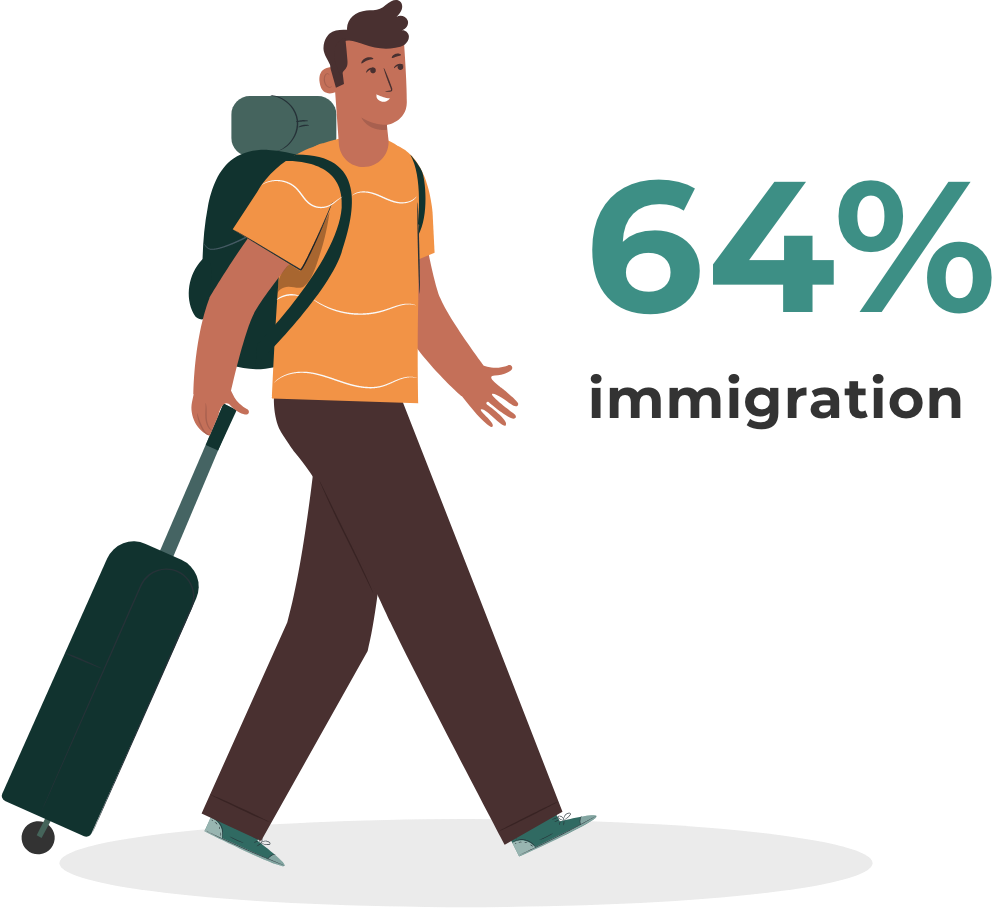How to Get a Job in Europe as an American
Because of strict labor laws, Americans may find it difficult to find a job in Europe. However, the mission is not impossible when you know requirements, regulations, and pitfalls. Read our article, and you’ll be fully prepared.
Because of strict labor laws, Americans may find it difficult to find a job in Europe. However, the mission is not impossible when you know requirements, regulations, and pitfalls. Read our article, and you’ll be fully prepared.

The United States remains the only developed country that doesn’t count how many of their citizens live abroad. According to some estimates, this number ranges from 4 to 9 million and changes rather quickly.
The Old Continent is one of the most popular places for relocation among Americans. The diversity of European countries offers a large number of job markets and multiple opportunities for foreigners. This article will tell you about finding a job in Europe as an American, the best countries for career relocation, most in-demand jobs, and steps that will make a job offer closer.
Why Americans decide to relocate to Europe
The United States is a net immigration country, which means that more people are settling in America than leaving it. However, the number of US citizens moving to Europe is growing, and according to Statista, 64% of expatriate citizens are not planning to return to the United States.
In Europe, the distances between countries are relatively short, so people can arrange get-away trips on weekends, enjoy traveling, and get familiar with unique cultures. Moreover, working in Europe opens up numerous possibilities for employers, including an average of four weeks of paid leave every year, a healthy work-life balance, and effective social security schemes. In addition, there is a shortage of IT specialists, engineers, and healthcare professionals, so foreign job seekers may find it easier to get a job offer in these fields.

The best European countries for Americans
Many US citizens relocating to Europe without a clear plan wonder what the best countries to settle down are. Undoubtedly, all EU countries have their pros and cons, and you will have to face a period of adjustment to the new culture and language. However, there are still several countries which are more popular among US citizens than others.
They include:
- The UK. When moving to the UK, Americans don’t need to learn a foreign language, making it much simpler to adjust to a new environment.
- Germany. This country is a second home to many Americans, and such global cities as Berlin, Hamburg, and Munich offer foreigners numerous job opportunities.
- The Nordic countries. Many people immigrate to Sweden, Denmark, Norway, and Finland because of their beautiful nature, high living standards, and one of the world’s best educational systems. Plus, locals have good English, so it’s easier to adapt.
- Italy. This country attracts foreigners who love long lunch breaks, sun, delicious cuisine, and sightseeing. Italy offers a good life-work balance and has a vivid job market.
Jobs for Americans in Europe
Before discussing how to get a job in Europe as an American, it is essential to decide what job interests you. Here are several careers that might be simpler to start if you are a USA citizen:
- Software development. The European market is digitizing, and there is a growing demand for software professionals, which provides more opportunities for those who are willing to move to Europe.
- Teaching English as a foreign language. TEFL is a rather common profession among American expats. However, the competition among TEFL in big European cities is rather tense. Try choosing less developed countries or smaller towns where native speakers are in higher demand.
- Hospitality and tourism workers. English is a global language. So native-speaking expats can search for openings at hotels, ski resorts, and bars. Try searching for front desk receptionist, event planner, or food and beverage manager positions. However, some of these jobs might be seasonal.
- Au Pair. Au Pair is a great opportunity for college graduates or expats without qualifications who are willing to live in the EU. The main responsibilities include helping with children, housework, and day-to-day tasks. Living in a family allows learning more about the local culture and demanded skills like responsibility, communication, and time-management.
Requirements in different European countries
Currently, American citizens don’t require a visa to visit the European Union and non-EU countries when staying up to 90 days. However, if you plan to study, work, and live in Europe, you will need a valid visa from the country. There isn’t a single permit that works across the entire Old Continent, so every country has its own requirements and regulations.
Schengen area
If you plan to relocate to one of 26 countries within the Schengen area, you will need to get a Schengen visa. Any application should include the following documents:
- Visa application form.
- A valid passport. Not older than 10 years and valid for at least three months after leaving the Schengen area.
- Travel insurance. It is health insurance with at least €30,000 coverage, which can be purchased online from Europ Assistance or AXA Schengen.
- Proof of accommodation. For example, a hotel or hostel booking, a letter of invitation, or a rental agreement.
- Proof of financial means. A document that proves that you have sufficient funds to support yourself during the stay in the Schengen area.
If you already have a job offer, you should also attach the employment contract and two application forms instead of one.
Americans relocating to Europe also need a European Blue Card. It is a residence permit to work in EU countries. It allows entering, staying, and re-entering the country which has issued it. The Blue Card holder and their family members can move freely within the EU. If the holder has been regularly employed for 18 months, they can move to another EU country to work there. The UK, Ireland, and Denmark don’t participate in the program.
Every country has its own rules, so you should find out the requirements well in advance. Below we will tell you about the relocation issues in several Schengen area countries.
1. Germany
If you plan to stay in the country for more than 90 days, you’ll need to apply for a residence visa. Make sure to collect all the necessary documents: two completed application forms, passport photographs, valid national passport, health insurance, an employment contract or a job offer, approval by the Federal Employment Agency, your updated CV, and proof of qualification.
Apart from the residence permit, you’ll need to report the future address, get a German bank account, and pay the fees (€110 for the first permit and €80 – for extensions).
2. Sweden
To move to Sweden, you should have a job offer. It is possible to get a work permit only if you have a contract, and an employer will pay you at least $1,300 per month before taxes. Required documents include a filled application form, notarized copies of the passport and permits, bank statements, health insurance with at least $37,000 coverage, a paid application fee, and Family Details Appendix.
3. The Netherlands
Americans who want to work and live in the Netherlands for more than 90 days should apply for a residence permit. The process consists of the following stages: applying for a residence permit online and determining the reason for a long-term stay, renting or purchasing a property, registering at the Town Hall, and opening an account at a Dutch bank.
Non-Schengen area
16 Europe-associated countries are not in the Schengen Area, including the United Kingdom, Ireland, Croatia, Cyprus, and Montenegro. If you decide to move there, you won’t have to apply for a Schengen visa. However, some countries have special requirements.
1. The UK
There are different types of visas, and the UK Government has a simple online test to help you decide which visa type you need. For example, if you are a skilled specialist and have a job offer, a Tier 2 (General) visa will be the right choice. The employer should be a licensed sponsor and offer at least a $37,500 yearly salary. You have to prove that you have sufficient funds upon arrival and a valid passport for this type of visa. You should also show a 5-year travel history and provide a criminal record certificate if the job offer includes working with vulnerable people.
2. Croatia
Americans willing to live in Croatia should be ready for several challenges. First of all, they must be offered a work contract before applying for a work permit. The permit is issued only for the term of the contract up to one year and can’t be renewed: if the company wants you to stay longer, it needs to issue a new work contract. During the first two years, you are not allowed to bring your spouse or children. Finally, if a company wants to offer you a job, it must ensure that a Croatian is not looking for the same role.
Application documents you will need
Job search consists of multiple stages, and preparing the necessary application papers is one of them. If you want to move to Europe and land an interview, writing a powerful resume and cover letter is a must. Below we will tell you how to cope with the task.
Resume
A resume is an advertisement of your experience and skills. It acts as a marketing tool to get you an interview, so it is rather important to create a strong document to impress hiring managers. Especially if they are located overseas, and you need to compete with local specialists. Here are things to keep in mind:
- Choose the right format. The most common are reverse-chronological, functional, and a combination of both. The choice depends on your education, work experience, and skills.
- Include a career objective. It is a self-introduction placed at the beginning of a resume highlighting your main competitive advantage—for example, extensive work experience and professional accomplishments. You can also add how you are planning to contribute to the company. Usually, a resume objective is two-three sentences long.
- Stick to one-inch margins. They make your resume look clean and suits even specialists who lack the experience to fill in the page. However, if you can boast impressive experience and need to reduce margins to create more space for text, try not to go below 0.5 inches.
- Use the GetCoverLetter resume builder. With its help, you can create a professional resume that meets job market standards and reflects your proficiencies in the best way.
Cover letter
A cover letter is an application document that introduces you to the company, explains why you are interested in the position, and helps you stand out from candidates who didn’t write such a letter or failed to do it qualitatively. The tips below will help you to succeed:
- Address your cover letter properly. Instead of using the impersonal Dear Sir/Madam or To Whom It May Concern, try to find the recruiter's name in the job posting, email address, LinkedIn, or company website. If the above doesn’t work, start your letter with Dear Hiring Manager.
- It should match your resume. Choose the same font and style so that your cover letter complements your resume. Matching application documents look well-thought and professional.
- Write every cover letter, anew. Hiring managers can distinguish a generic cover letter from a customized one. If you want to stand out and be noticed, take some time to write a personalized letter tailored to a particular position.
- Create a cover letter with the GetCoverLetter builder. All you need is to choose your strengths and skills, and our builder will create a winning customized self-presentation in a matter of minutes.
Tips on getting a job in Europe if you are American
Relocating isn’t an easy process, especially if you need to apply for visas, open bank accounts, and prove that you are more qualified than local specialists. To help you simplify this process, we have made a list of useful tips and tricks.
Expand your job searches
To enter the new labor market, you need to catch the attention of as many potential employers as possible. Make a list of your proficiencies and skills and search for available vacancies that fit your current competence. Try not to focus only on the position you’ve occupied in the USA. Instead, consider several job options in the selected industry, including even entry-level positions. This tactic will help to enter the local labor market more quickly.
Do the networking
Networking is a useful tool for job hunting, especially if you are willing to relocate abroad and don’t know anyone there. When searching for jobs in Europe, try to create reliable contacts online.
The networking process may include getting acquainted with people in the company you are interested in via social media platforms or professional networks like LinkedIn. Don’t forget to indicate the industry in which you would like to work, your core strengths or competitive advantages, your willingness to move to a particular country, and the relocation's possible timing.
It is also a good idea is to join specialized groups on Facebook or forums where expats share their experience, answer questions, and make new acquaintances.
Look for offers on job boards
Industry-specific boards allow searching for job offers faster and easier. For example, platforms like Eurojobs and Abroad publish vacancies across Europe, while JobsIn Network lists solely English-language vacancies. Another industry-oriented board to keep in mind is Tefl. There you may find job offers for English teachers.
You can also search for vacancies on international platforms that have a broad selection across Europe. Finally, try to find job boards that locals use if you already know what country you’d like to work in. This will help you understand what industries and occupations are in demand in the local job market.
Target international companies
One of the best tips on how to work in Europe as an American is to focus on multinational companies. As a rule, they offer more securities and job satisfaction for foreigners and are more eager to hire specialists with fluent English and the necessary qualifications. Plus, big international companies often cover visa expenditures, help with documents, and offer relocation packages for specialists’ families.
Start learning the language
English is one of the most spoken languages globally, and citizens of big European cities usually speak it on a decent level. However, many people don’t speak English, and it will be rather difficult for you to develop fruitful contacts or complete day-to-day tasks without knowing the local language. Meanwhile, knowing it on at least a basic level will help you prove your commitment, compete with local candidates, and translate your resume and cover letter, which will significantly increase your chances of getting an interview invitation.
Takeaways
The Old Continent is extraordinarily diverse, and if you decide to relocate, there will surely be a fair offer on the market. However, you should make a clear action plan to choose the best country, find a suitable job offer, and handle bureaucracy and visa requirements. Therefore, arm yourself with our guide, prepare all the necessary documents like a resume and cover letter to impress employers and land an interview, and be persistent on the way to your dream.

